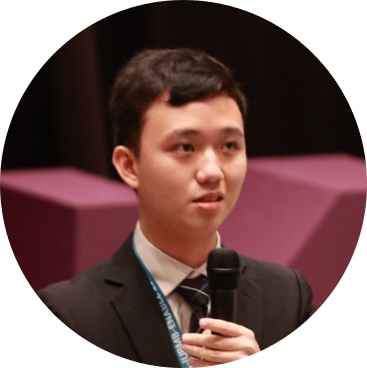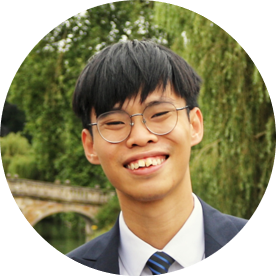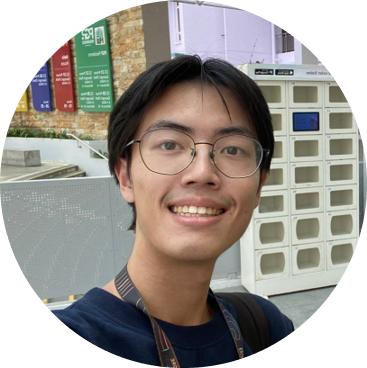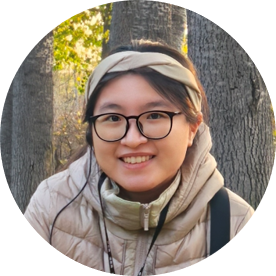This site uses cookies
By clicking accept or continuing to use this site, you agree to our use of cookies. For more details about cookies and how to manage them, please see our Privacy Notice.
The Undergraduate Research Library Fellowship offers competitive undergraduate research fellowship opportunities for students to pursue research with a Southeast Asia focus, involving source materials in our main and special collections. This opportunity is open to all NUS undergraduate students regardless of their disciplinary backgrounds. Dive into our resources or partner with us to acquire materials!
Congratulations to our 3rd batch of fellows for their outstanding project submissions. Their research projects are selected for their significance in addressing scholarly gaps in Southeast Asia, potential in utilising/contribution to NUS Libraries’
collections, project innovation, and feasibility.

Brandon Cheah Chong Joon
Brandon is a first-year Pharmaceutical Science undergraduate with minors in Life Science and Music. He has an interest in dengue immunology, specifically in studying the diagnostics and differentiation of dengue serotypes in the population. Outside of biomedical science, he engages in music theory research, with interests in Schenkerian theory.Differentiating Dengue Serotypes Using Monoclonal Antibody-based Methods for Clinical Diagnosis and Seroprevalence Estimation
Mentor
Annelissa Chin Mien Chew
On one hand, the support given by Annelissa has helped to improve my skills in literature search and NUS Libraries' resource exploration. I am grateful for her advice, and many of the advice could be used in my research pursuits in the future.
Additionally, the funding provided by the fellowship is a rare opportunity for undergraduate students—who would not have had funding otherwise—to fund research projects that they are interested and invested in. As the first experimentalist awardee of the fellowship, lab materials can be expensive, with an antibody costing up to SGD1000 for purchase. Having the financial means to cover the costs of the project provides me with a lot more intellectual freedom to pursue interesting findings and not be afraid of failure.
Lastly, I would like to thank my supervisor, Dr Tan Chee Wah, and team for their invaluable guidance in running the day-to-day experiments and for their intellectual mentorship. Having good and supportive supervisors truly makes the whole process an exciting one. I highly encourage undergraduates from all disciplines to choose a supportive mentor, and apply for future iterations of this scholarship. You may never know if the small investments you make in research today may change the world in the future!

Isabelle Singarayar
Isabelle is an Anthropology student who loves travelling, experiencing diverse cultures, languages, and natural landscapes. These interests have led her to pursue research that fosters progress in giving voice to marginalised groups for the betterment of society.Chinese and Indian Christians, Racism, and Islamophobia in Singapore
Mentor
Nur Diyana Binte Abdul Kader
The realities on Christian Singaporeans, the racial dynamics within them, and how they interact with especially Malay-Muslims are deeply unique and important to Singapore’s sociocultural landscape, but rarely acknowledged. Ultimately, my purpose in doing so was to shed light on the experiences of especially marginalised and minoritised brown communities in Singapore. As anyone with a goal in mind, these goals are sometimes not met, or they fluctuate and change as the project process evolves. My goal was never to find a fully uncover the racism that Malay-Muslims experience, or the lives of all Christian Singaporeans, but this research process definitely exposed me to the intricate complexities of a solo project that sometimes left me demoralised.

Jeff Chin Chen Kai
Jeff is a final-year student majoring in Political Science and History, with a minor in Southeast Asian Studies. His interdisciplinary education at the former University Scholars Programme (now NUS College) has fostered his interests in various subjects. For leisure, he enjoys reading, travelling and spending time in nature.Burning Traditions: Tracing the Singapore Government’s Approach to Joss Paper Burning
Mentor
Chow Chai Khim
Apart from the stipend that helped me reimburse my interviewees and finance my travels between joss paper shops across various estates, the fellowship had also exposed me to the plethora of resources in NUS Libraries that made my research process much smoother. While I had visited the library building quite often in the past, it was only during the fellowship that I learned about the microfilms here. This definitely saved me the hassle of visiting the National Library just to capture images of old newspaper articles.
On top of that, the fellowship also introduced me to the most helpful and knowledgeable librarians we have on campus. I am extremely grateful to my librarian mentor Chai Khim (and Li-Jen and Jie Ying as well) for teaching me how to use the microfilms in the library, and introducing me to a variety of resources that I could consult for my research. One such resource was the oral history recordings and transcripts uploaded to the National Archives database. As someone new to conducting oral history interviews, I faced many uncertainties in how I should record and transcribe my interviews. Fortunately, Chai Khim pointed me to the transcriptions on the National Archives database as a reference. I believe this also contributed to the quality of my research output.
Finally, on that note, I appreciate NUS Libraries' interest in storing my interview recordings and transcripts. This has expanded my research output beyond the thesis paper I had written, since I can now make some of my primary sources accessible to future researchers. I am deeply honoured to be able to contribute to the library's resources and possibly inspire new research pathways. Indeed, I think this fellowship has helped me realise that one does not need to be a graduate researcher to be able to conduct useful and meaningful research. I thus encourage any undergraduate who is interested in research (even if it is a slight interest) to take the leap of faith, apply for this fellowship and witness how much you can achieve.

Jonah Lo Zhu Ern
Jonah is a third-year History student. Straddling the fields of diplomatic, political, and social history, he is interested in how elites and publics in Southeast Asia construct, perform, and contest foreign affairs. He has published in the Cambridge Journal of Political Affairs, the Defense Horizon Journal, and the Strategy Bridge.They’re Stealing Your Women, Corrupting Your Children: Backlash Against Westernisation in Singapore’s Post-Cold War
Mentors
Herman Felani Bin Md Yunos
Associate University Librarian and Head of Archives & Digital Preservation

Shawn Wongosari
Assistant Librarian (Collections Management & Preservation)

Ng Rui Kyi
Rui Kyi is a year 3 Medical student with a keen interest in interdisciplinary research, exploring the intersections between public health and geography. She aims to contribute to innovative approaches to tackle healthcare challenges on a global scale. For leisure, she enjoys playing sports and learning music.Accessibility of Maternal Healthcare Services in Rural Southeast Asia - a Systematic Review
Mentor
Wong Suei Nee
Senior Librarian (Research Librarian – STEM)
This experience not only deepened my interest in these fields, but also equipped me with the skills to work independently. It pushed me to take initiative and affirmed my desire to continue pursuing research that bridges multiple domains of knowledge.
Throughout this journey, NUS Libraries has played a crucial role in supporting my work. From access to well-curated databases and specialised resources, to the guidance provided by my mentor Suei Nee, NUS Libraries has been an invaluable support in my research. I am very grateful for the resources and support that have shaped my development as a student researcher.

Tu Weizhi
Weizhi is a first-year student majoring in Data Science and Economics. His interests are in the modern banking industry which is constantly evolving and playing an increasingly pivotal role in the world. For leisure, he enjoys night running and bedtime coffee which have proudly become his lifestyle.From Empire to Independence: A Historical Analysis of Banking in the Post-War Singapore, 1945 to 2025
Mentor
Kho Su Yian
Principal Librarian (Research Librarian – HASS)
Under this fellowship, I explored the banking history of Singapore which is very important and helpful for acquiring a more comprehensive understanding of the island-state's unique financial industry. I have seen a clearer trend of the government's stance in regulating and developing the sector, which plays the centric role in building the global financial hub. In the modern age, the world becomes deeply interconnected with trade and technology and Singapore banks are at very favourable positions to grow regionally and globally which would further reinforce the nation's competitive edge even amidst today's greater uncertainty.
Along the research journey, I obtained immense help from my supervisor Prof Seng and NUS Libraries mentor Ms Su Yian in terms of navigating through the vast collections of resources, and in how to conduct a formal and in-depth research project. I attended the libraries' Researcher Unbound series which provided invaluable training in advanced research techniques and database utilisation.
The fellowship has solidified my interest in the banking industry, and I intend to leverage this work to pursue further research and career opportunities in the local and regional financial sectors. I am keen to further develop this research, specifically examining how technological advancements and regional economic integration are shaping the future of banking in Singapore and Southeast Asia.

Zhang Ming
Zhang Ming is a final-year Global Studies undergraduate specialising in Colonialism, Security and Global Order, with a second major in Japanese Studies. She is deeply interested in East Asian geopolitics, identity politics and the intersection between environment and individual. In her free time, she enjoys playing the piano and photography.My Health, My Way: Scientific Citizenship in Singapore Against Global Health Threats
Mentor
Stephanie Ng Yen Ping
As a fellow, the stipend allowed me to provide my interviewees with ample compensation for the valuable insights that they have given me. Applying for and managing my funds from the fellowship was also an essential part of this real-world research experience. I regularly accessed the discussion room in the Central Library for a quiet and conducive space to review my literature. My deepest gratitude goes out to my library mentor Stephanie, my thesis supervisor Dr Shelley, and the fellowship coordinators for their timely and patient guidance.
As a member of society, conducting this research highlighted to me the symbiotic relationship between human health and the environment where our essential resources originate from, suggesting the need for a collective responsibility to live sustainably. The insights from my interviewees demonstrated an alignment between this collective responsibility and the concerns of Singaporean parents for their children's futures, suggesting that they could be the key target audience for the promotion of sustained action against GEHTs moving forward.
Applications have closed. Please look out for updates on the next call which is expected to open around the start of the next academic year (AY 2026/2027), subject to changes. Following a review, this new timeline aims to facilitate ease of submissions as it aligns with the academic calendar.
| Late Aug 2026 | Applications deadline |
| Mid Sep 2026 | All applicants will be notified of decisions |
| Late Sep 2026 | Submission of workplan by Undergraduate Research Library Fellows |
| Early Oct 2026 | Start of fellowship |
| Jan 2027 | Submission of progress report to library mentors |
| Q1 2027 | Symposium |
| Mid Apr 2027 | All projects to conclude by this point |
